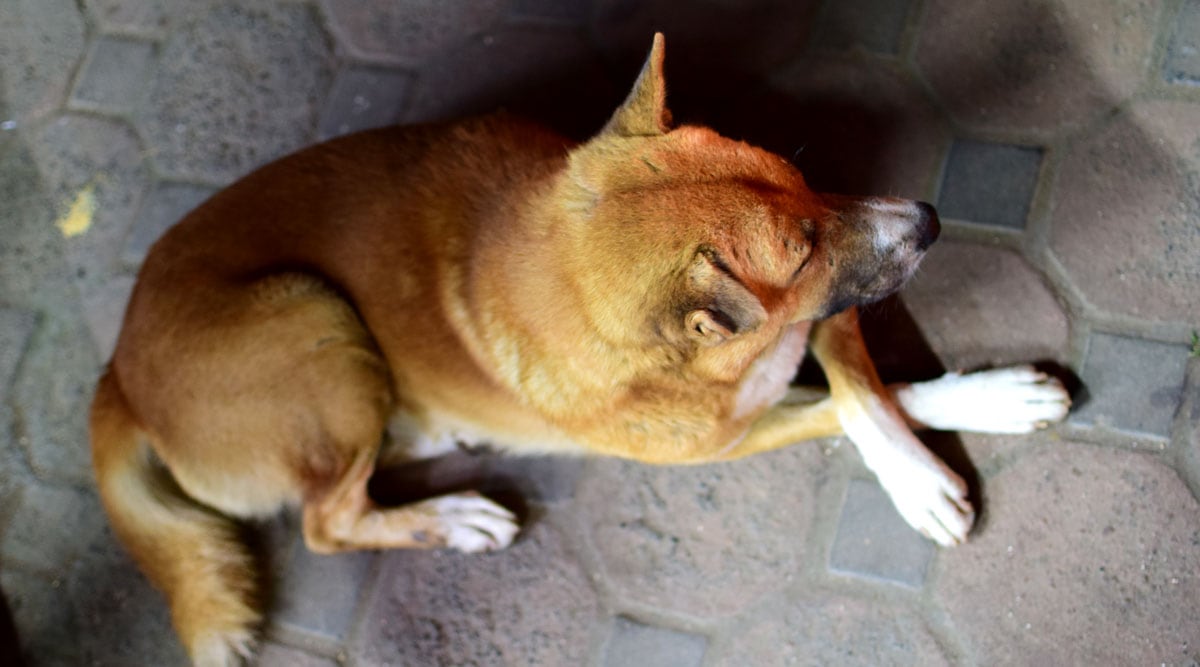Is your dog refusing to lie down? Or are they lying in a strange position? If so, this could be a sign of pain. Keep reading to find out why this happens and other symptoms to watch out for.
Contents
For this reason, it’s important to be aware of your dog’s body language and posture. These are often the only early warning signs that everything might not be fine with your pup.
While the most common symptoms of pain in a dog are limping and whining, many dogs won’t make a problem so obvious. An example of a subtler symptom is if your pup won’t lie down or has difficulty staying in one position for any length of time. Your dog may also keep attempting to lie down before getting up or pace the room while panting.
Why Dogs Won’t Lie Down
There are many reasons why a dog might not want to lie down, but they generally fall into three categories: pain, illness, or stress. Here’s an overview of some of the most common reasons.
Pain Due to Illness
The simplest explanation for why a dog won’t lie down is that it’s painful to do so. If your pup is hurting internally, lying down may put pressure on his sore spot. This could also result in your dog resting in strange positions.
There are a number of potential causes for this type of pain. For example, if your dog suffers from osteoarthritis or back pain, his joints may be sore, making it difficult to lay down. If other symptoms are present, such as diarrhoea or vomiting, this may indicate a gastrointestinal problem such as gastroenteritis or pancreatitis. Diseases such as Lyme’s can also cause pain and lethargy.
“One of the more common causes of a dog who suddenly won’t sit or lie down is a blocked or infected anal gland”, says vet Dr Linda Simon. “Other signs can include bum scooting and chewing at the rump.”
Bloat is another potential cause of a dog who doesn’t want to lie down, as it can cause severe abdominal bloating and discomfort. This condition requires urgent medical care, as it’s fatal without emergency surgery.
Additionally, heart disease may prevent a dog from laying down. Heart disease can cause the dog’s body to lack oxygen, so they may stay standing to ease their breathing and prevent fluid from pooling.
Stress or Anxiety
Not lying down isn’t always a symptom of pain or illness though. If your dog is anxious or stressed, he may not feel relaxed enough to settle down.
This could be caused by being in a new location, noise phobias (such as fireworks), separation anxiety, or a new pet or person in the home. Stress in dogs can also be caused by arguments in the household or negative training methods.
So, if you notice any unusual behaviour from your pet, check whether there is something in the house that could be causing anxiety.
Canine Dementia (CCD)
Canine cognitive dysfunction (CCD), which is sometimes known as canine dementia, is another potential cause of a dog that doesn’t want to lay down.
CCD often causes the dog to become confused or restless. This can lead to the dog pacing, walking in loops, and a general reluctance to lie still.
Other symptoms of CCD can include:
- Irritability or behaviour changes
- Altered sleeping habits
- Toileting indoors
- Increased vocalisations
- Confusion
- Failure to recognise familiar people
- Lack of interest in play or other activities
You should discuss CCD with your vet if you notice any of these symptoms. While the condition can’t be cured, there are many ways to manage it and improve the dog’s quality of life.
Should You Contact a Vet?
As you can see from the list above, there are many potential reasons why your dog won’t lie down. Some of these aren’t serious and likely to go away quickly. Others are potentially dangerous if left untreated.
When it comes to your dog’s health, it’s always a good idea to be on the safe side. A dog can rapidly deteriorate if a serious problem is left untreated.
For this reason, you should contact your vet if you notice your dog isn’t lying down and the problem continues. Keep an eye out for any additional symptoms (including changes in stool, urine, eating and behaviour) and give your vet as much information as possible.
Other Symptoms Your Dog is in Pain
There are a variety of other symptoms that your dog is in pain or discomfort. These include:
- Constant grooming of a specific area. Dogs naturally want to groom a wound. Even if there isn’t an actual cut, dogs will often lick the area in an attempt to relieve the pain. If your dog starts to groom an area more than usual, you should contact your vet.
- Panting or shallow breathing. Any difference in breathing that isn’t caused by exercise is a potential symptom of pain. If your dog is continuously panting, it could be painful for him to breathe. Shallow breathing or panting can also be caused by warm temperatures.
- Vocalisations. Dogs that are in pain may sometimes become more vocal. This includes whining, whimpering, howling and aggressive/defensive noises such as snarling and growling. If this is out of character for your dog, there may be a health problem causing it. “It is worth remembering that many dogs are quiet when in pain though, so we should not expect them to be vocal,” says Dr Linda Simon. “Often owners will tell me they don’t think their dog is in pain because they’re not moaning or yelping, but this is not to be expected. All too often, those who suffer in silence are not treated promptly.”
- Change in behaviour. As dogs can’t tell you when they feel ill, the only way to notice is to observe their behaviour. Any change in behaviour, from withdrawing affection to growling more, could you a sign your pup is feeling unwell. Dogs that are injured may also become more aggressive, as they are worried about being hurt.
Be careful if you think your dog is unwell or in pain. Even docile dogs can become aggressive when they are ill. If your dog allows it, you can try to feel the area of pain, but be aware that touching a painful spot can cause a dog to bite. You should contact your vet if any of the symptoms in this article continue.
Summary
If your dog won’t lie down, it’s likely to be a symptom of pain or anxiety. This could be caused by arthritis, painful spine, stomach problems or a variety of other conditions.
It’s often difficult to diagnose health issues in a dog, which is why you should get a professional veterinary diagnosis if the problem continues.




